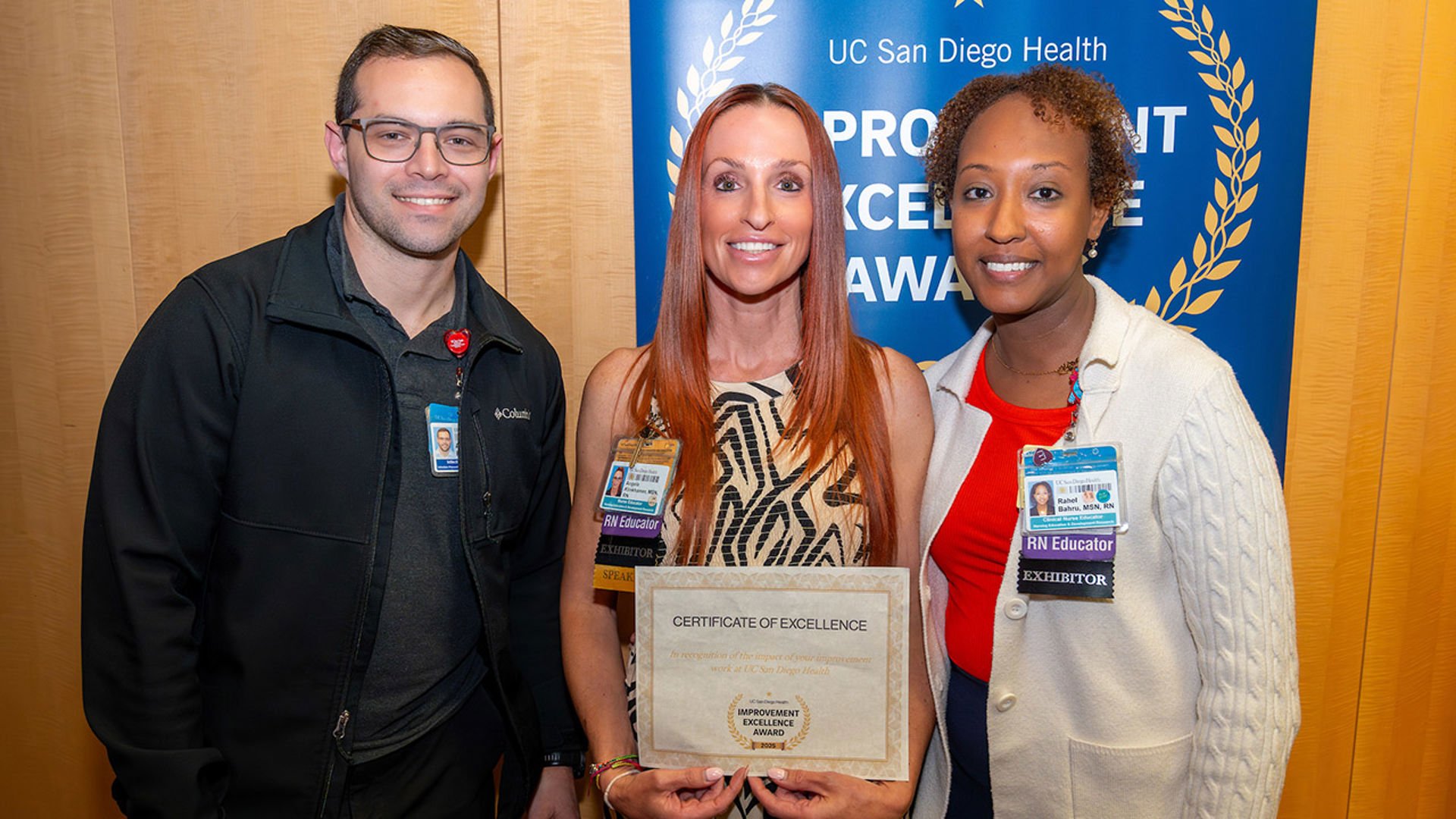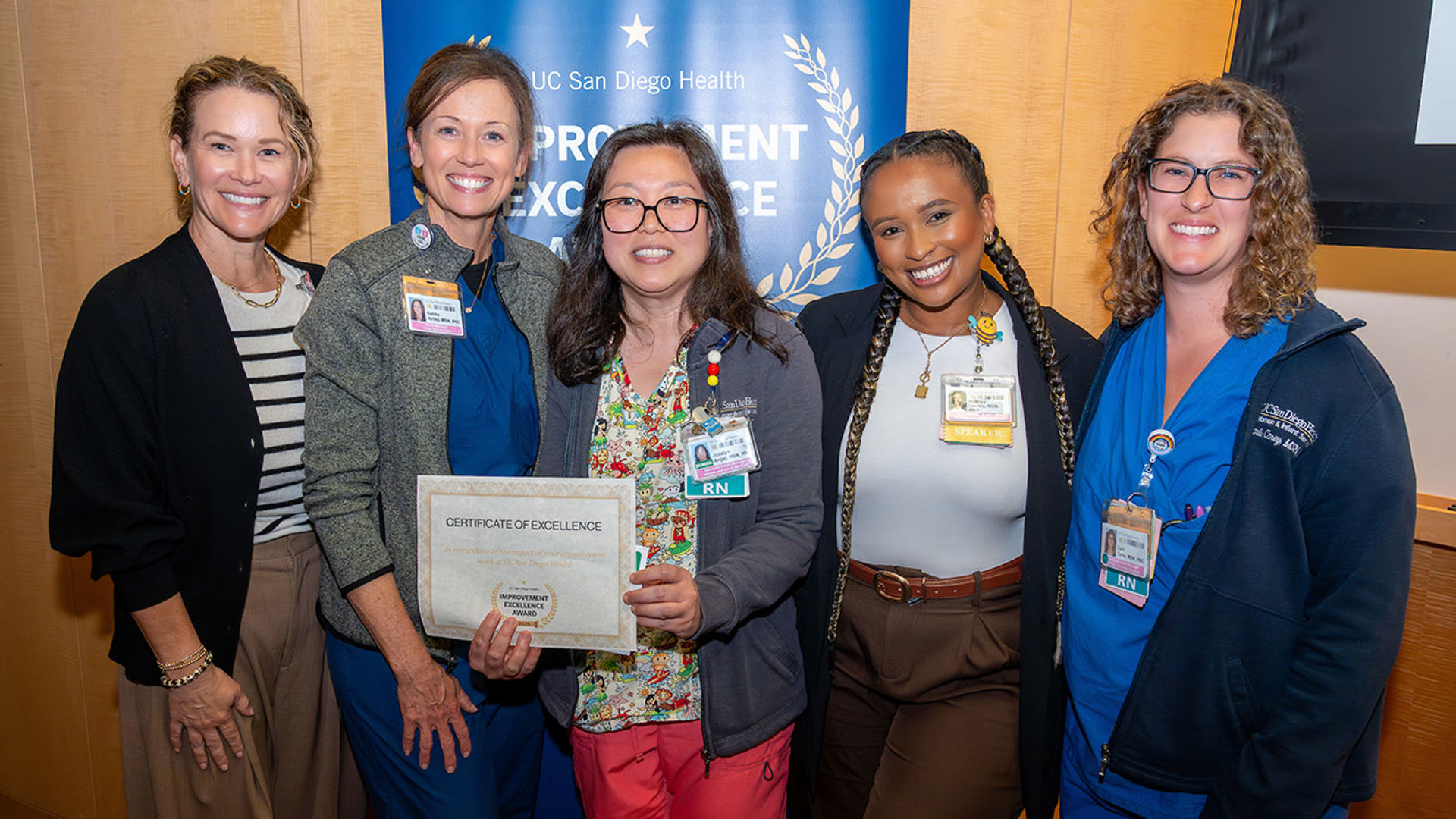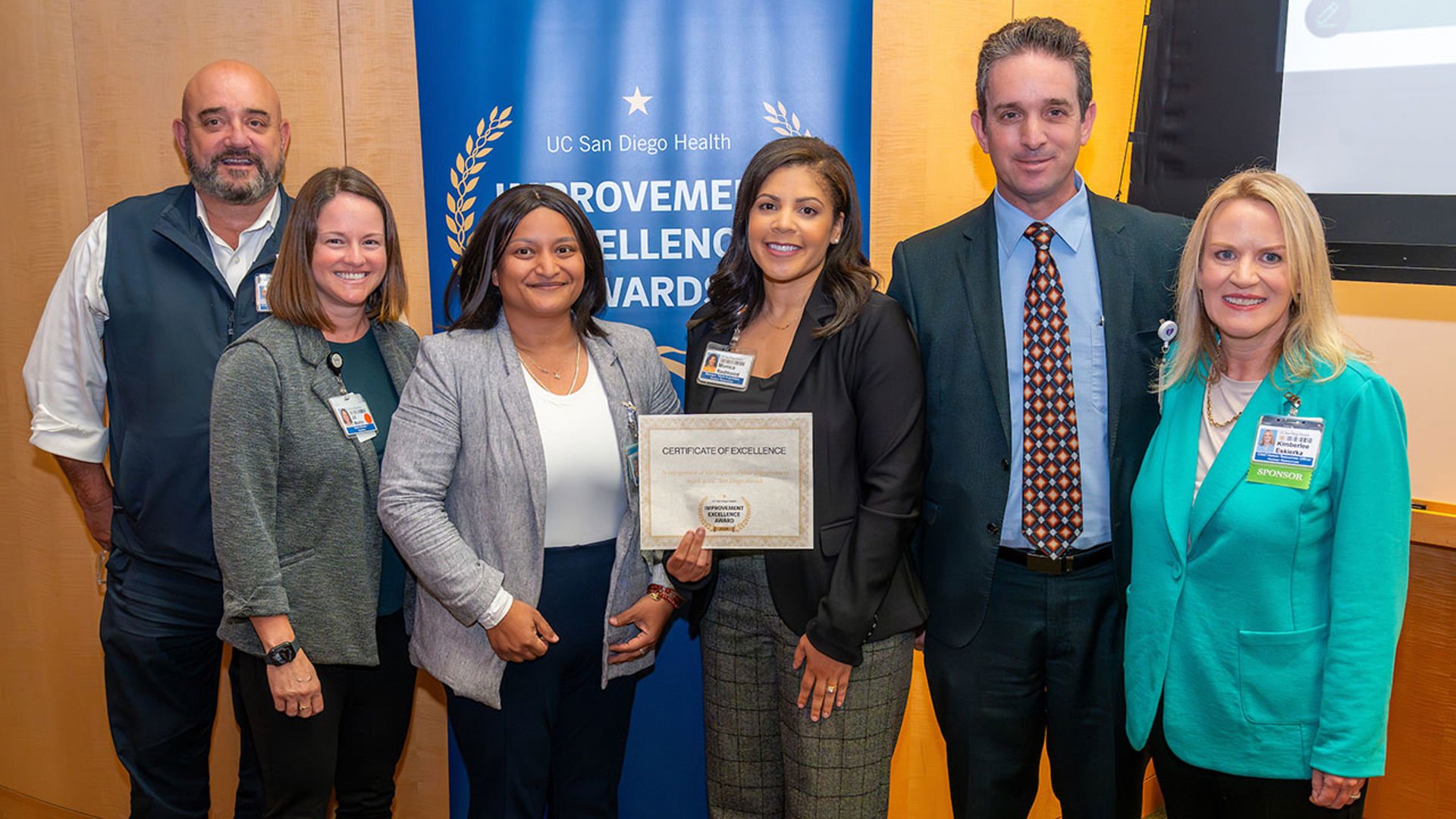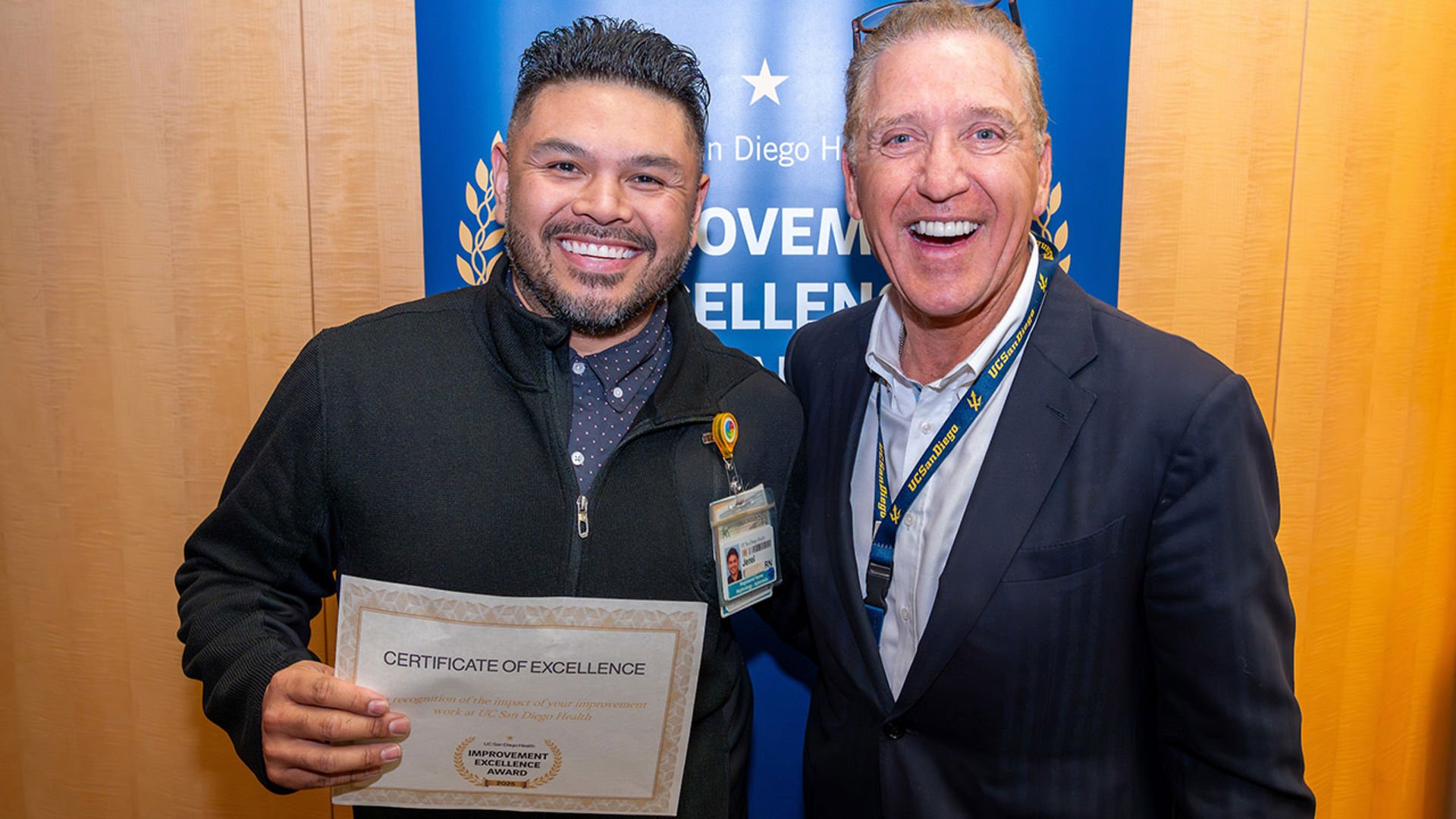
The grand prize winning team improved new patient access to gastroenterology services by implementing initiatives that enhanced efficiency and streamlined care delivery. Awardees (not all pictured): Carrie Aguilar, Lauren Alden, Julie Barro, Shannon Brown, Mia Camaquin, Mitch Castro, Eileen Dai, Christine Dimalanta, Jeremy Flowers, Justin Gauthier, Aaron Hart, Jamie Janis, Dyan Kirschenman, Jessica Kovall, Rohit Loomba, Miguel Marquez, Gabe Rosario, Joshua Rubin, Matthew Satre, Matthew Tsai, Sean Villafranca (Photo credit: Alexander Matthews, UC San Diego Health)
The UC San Diego Health Improvement Excellence Awards, launched in 2023, honor staff and teams who drive positive, measurable improvements in quality, efficiency, and experience of care. These awards highlight how innovation, teamwork, and dedication to patient-centered values are reshaping health care delivery.
Selected by a committee of clinical and operational leaders, winners are recognized for initiatives that align with UC San Diego Health strategic goals of making care safer, faster, more equitable and more responsive to the needs of diverse communities. These awards celebrate individuals and teams advancing meaningful change and highlight the best practices that can be scaled across departments and institutions.
The award categories include: Pursuit of Quality, Patient Experience, Improving Access, Advancing Health Equity, Fostering Our Culture, and Efficiency of Operations.
Among the 13 impressive projects recognized this year, one initiative was acknowledged for its exceptional impact and was named the grand prize winner in the Improvement of the Year category for transforming how patients access specialized digestive care.
In this Q&A, UC San Diego Health gastroenterology (GI) and hepatology project leads Shannon Brown, senior director, and Sean Villafranca, associate director, share how their work accelerated patient access to care, enhanced coordination among providers, and is now influencing care models across the nation.
What inspired your team to improve how patients access GI care?
As the only academic medical center in the region with many subspecialties, we realized we could improve the referral process to be more efficient and create a better experience for both patients and providers. Our team developed a comprehensive process that led to faster access, better alignment with providers, and a smoother journey for patients seeking stomach and digestive services.
How did you approach redesigning the GI access experience?
The team introduced a virtual expedited consult clinic (ECC) where advanced practice providers (APPs), such as nurse practitioners and physician assistants see new cases within 10 days. They review medical history, discuss symptoms and concerns, order tests, or make referrals for procedures if necessary. This approach helps avoid multiple visits simply to determine the next steps.
To further streamline access, we worked to give patients the ability to self-schedule their appointments online. Today, 25% of general GI patients schedule their own appointments, empowering them while easing the administrative burden on scheduling staff.
We also built a sophisticated decision tree to direct patients to their appropriate subspecialty or back to primary care when GI specialist visits weren’t necessary. We worked closely with scheduling, medical assistants, physicians, and operational leaders to make the system work collaboratively.
Additionally, to improve care coordination, e-consults were enabled so primary care providers could receive specialist input without a formal visit. E-consult usage increased by 60%, allowing patients to get answers faster and reducing unnecessary appointments.
What impact did these changes have on patient care?
GI patients are now seen much faster. Procedures are scheduled more quickly, which means diagnoses and treatments start sooner. Physicians report that patients arrive with better-prepared information, allowing meaningful treatment at the first specialist visit instead of delays. Experience scores have improved because patients feel valued when they receive timely care. APPs can initiate low-level treatments and order tests upfront so doctors can focus on higher-level care and treatment. The collaborative model also uncovered other improvements, like improved interpreter services for those with limited English proficiency.
How has this project changed the way staff work together?
This wasn’t just a single department’s project, it involved scheduling staff, medical assistants, APPs, physicians, information services, and leaders in true collaboration. By applying Lean Six Sigma principles, like cross-functional teamwork and continuous improvement, we found shared solutions no one could have developed alone. Primary care doctors now feel more connected through e-consults and ongoing communication. The project has sparked a culture of problem-solving, where providers are motivated to take on new challenges using the same mindset.
Is this model being expanded beyond GI?
The success of this project led to a system-wide access initiative. The framework is being adapted for other medical specialties, such as pulmonary, dermatology, and hepatology. Each specialty tailors the approach, but the core principles remain consistent: improve access, enhance coordination, and streamline care.
Other academic medical centers across the country are also looking at our model as a potential solution to similar access challenges. While adaptations may be needed, the approach shows promising potential to improve access nationally.
What does winning the Improvement Excellence Award Grand Prize mean to your team?
It validates the power of collaboration. The project’s success reflects the value of every team member’s contribution and a shared focus on solving a real challenge. Even after launching more than a year ago, the team continues to refine and improve the program. Winning this award motivates the team to keep innovating and shows that their hard work is creating meaningful change at UC San Diego Health and beyond.
Improvement of the Year Winners

Pursuit of Quality – Developed specialized infection-control technology to minimize the risk of serious infections among dialysis patients, leading to a measurable reduction in infection rates. Awardees (not all pictured): Jessica Alicdan, Rahel Bahru, Aryeh Feldheim, Shirl Fayson-Miles, Calvin Fong, Angela Klinkhamer, Frank Myers, Nick Worn (Photo credit: Alexander Matthews, UC San Diego Health)

Patient Experience – Enhanced nurse-patient communication to refine overall patient experience and satisfaction. Awardees (not all pictured): Jeanine Adams Kotz, Jocelyn Angel, Carli Carey, Brittney Daniels, Lauren Dexheimer, Ala Garza, Eema Hemmen, Jackie Iseri, Gabriella Kelley, Anna Kidman, Brooke Sanchez, Becky Yahyai (Photo credit: Alexander Matthews, UC San Diego Health)

Fostering Our Culture – Launched a career development program in the Sterile Processing Department, improving staff satisfaction and improved patient care outcomes. Awardees (not all pictured): Rosalinda Abarca, Jason Carino, Annet Cantor, Jesus Delgado, Akira Dubb, Alicia Daniels, Erica Fiore, Iliana Gastelum, Jonathan Hellsing, Dina Johnson, Donna Jerez, Doug Levine, Melissa Marquez, Ladonna McCray, Chad Norton, Ed Paige, Paul Pena, Monica Redmond, Mallory Rico, Martha Rosales, Kassandra Sanchez, Karina Servin, April Striplin, John Tamayo, Madelyn Uy (Photo credit: Alexander Matthews, UC San Diego Health)

Efficiency of Operations – Reduced medication waste and improved overall efficiency of the Extracorporeal Photopheresis (ECP) procedure. Awardees (not all pictured): Ashley Dalton, Tracie Imblum, Jerel Malong, Sam Martinez, Phil Preiksaitis, Amber Sanchez, Yun Yang (Photo credit: Alexander Matthews, UC San Diego Health)

Application of AI Technology – Utilized advanced software to deliver personalized training for providers and nurses, boosting efficiency and staff morale. Awardees (not all pictured): John Bell, Jason Carino, Eraiza Genilo, Kepa Francisco, Mark Grisafe, Karuna Jay, Brian Kwan, Andrea Martin, Marlene Millen, Allen Tran, Miriam Tonner (Photo credit: Alexander Matthews, UC San Diego Health)
Stomach and Digestive Care
Our gastroenterologists are nationally recognized for their innovative care of people with gastrointestinal and liver diseases.


